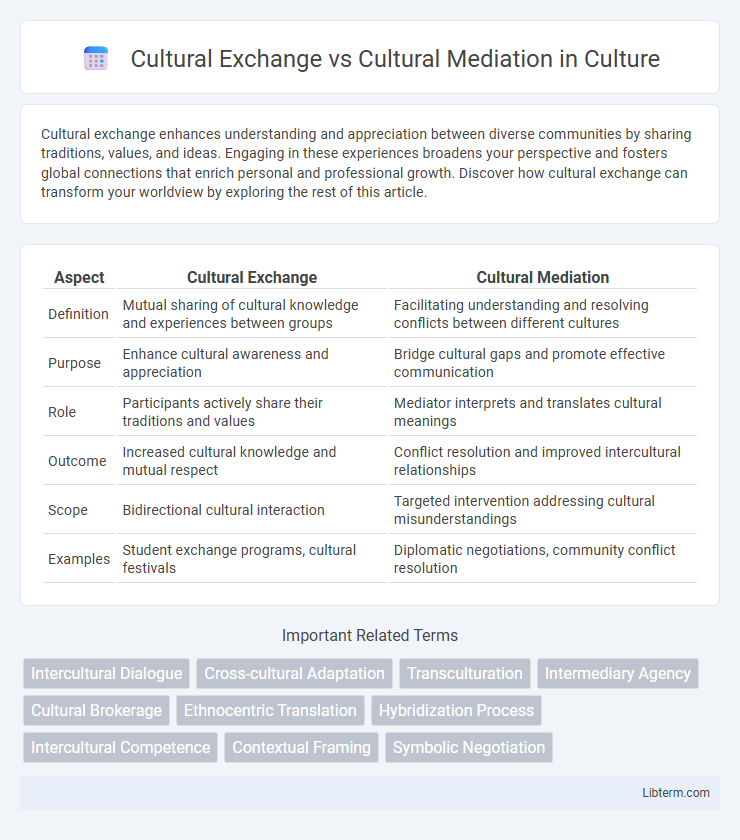Cultural exchange enhances understanding and appreciation between diverse communities by sharing traditions, values, and ideas. Engaging in these experiences broadens your perspective and fosters global connections that enrich personal and professional growth. Discover how cultural exchange can transform your worldview by exploring the rest of this article.
Table of Comparison
| Aspect | Cultural Exchange | Cultural Mediation |
|---|---|---|
| Definition | Mutual sharing of cultural knowledge and experiences between groups | Facilitating understanding and resolving conflicts between different cultures |
| Purpose | Enhance cultural awareness and appreciation | Bridge cultural gaps and promote effective communication |
| Role | Participants actively share their traditions and values | Mediator interprets and translates cultural meanings |
| Outcome | Increased cultural knowledge and mutual respect | Conflict resolution and improved intercultural relationships |
| Scope | Bidirectional cultural interaction | Targeted intervention addressing cultural misunderstandings |
| Examples | Student exchange programs, cultural festivals | Diplomatic negotiations, community conflict resolution |
Introduction to Cultural Exchange and Cultural Mediation
Cultural exchange involves the reciprocal sharing of traditions, values, and practices between distinct cultural groups to foster mutual understanding and respect. Cultural mediation serves as a strategic process where mediators facilitate communication and resolve conflicts by interpreting cultural nuances to bridge differences effectively. Both concepts promote cross-cultural interaction but differ in approach: exchange emphasizes mutual sharing, while mediation focuses on managing and interpreting cultural disparities.
Defining Cultural Exchange
Cultural exchange involves the reciprocal sharing of cultural elements such as traditions, language, art, and customs between different communities to foster mutual understanding and respect. This process emphasizes the open, voluntary participation of individuals or groups to experience and appreciate cultural diversity firsthand. Defining cultural exchange highlights its role in building cross-cultural relationships by promoting dialogue and collaboration without external intervention or mediation.
Understanding Cultural Mediation
Cultural mediation facilitates deeper understanding by actively bridging communication gaps between diverse cultural groups, whereas cultural exchange primarily involves sharing traditions and customs. Cultural mediators interpret not only language but also cultural norms, values, and social contexts to prevent misunderstandings and foster mutual respect. This process is essential in multicultural settings such as international organizations, healthcare, and education, ensuring effective collaboration and social integration.
Historical Contexts of Cultural Interaction
Cultural exchange involves the reciprocal sharing of traditions, customs, and knowledge between distinct societies throughout history, fostering mutual understanding and collaboration. Historical contexts such as the Silk Road and colonial encounters highlight how cultural exchange facilitated the diffusion of art, religion, and technology. In contrast, cultural mediation refers to the active role of intermediaries who navigate and resolve misunderstandings between cultures, often emerging during periods of conflict or colonization to bridge divergent worldviews and communication barriers.
Key Differences Between Cultural Exchange and Mediation
Cultural exchange involves the mutual sharing of traditions, values, and customs between groups to promote understanding and appreciation. Cultural mediation, in contrast, focuses on resolving misunderstandings and conflicts by facilitating communication and interpretation between culturally diverse parties. Key differences lie in cultural exchange's emphasis on reciprocal learning, whereas cultural mediation prioritizes conflict resolution and bridging cultural gaps.
Benefits of Cultural Exchange Programs
Cultural exchange programs enhance cross-cultural understanding by immersing participants in diverse traditions, fostering empathy and reducing prejudices. These programs promote language acquisition and global networking, which benefit personal development and future career opportunities. Experiencing different cultural perspectives cultivates adaptability and intercultural communication skills essential in today's globalized society.
The Role of Cultural Mediators
Cultural mediators serve as essential bridges between diverse communities, facilitating understanding and resolving conflicts by interpreting cultural nuances and social norms accurately. Unlike general cultural exchange, which involves mutual sharing of cultural practices, cultural mediation requires specialized knowledge and skills to navigate complex intercultural interactions effectively. Their role enhances communication in multicultural settings, promotes social inclusion, and supports integration processes within globalized environments.
Challenges in Cross-Cultural Communication
Cultural exchange involves sharing customs and traditions between groups, often requiring participants to navigate inherent differences in language, values, and social norms, which can lead to misunderstandings and misinterpretations. Cultural mediation addresses these challenges by actively facilitating communication and negotiation between cultures, yet it faces obstacles such as power imbalances, differing worldviews, and the mediator's need to maintain neutrality and cultural sensitivity. Both processes demand heightened intercultural competence and adaptive strategies to overcome barriers in cross-cultural communication effectively.
Impact on Globalization and Integration
Cultural exchange facilitates the direct sharing of traditions, art, and customs between communities, fostering mutual understanding and enriching globalization by promoting diversity and cross-cultural appreciation. Cultural mediation, however, acts as an interpretive bridge that resolves misunderstandings and negotiates cultural differences, enabling smoother integration within multicultural societies and global institutions. Both processes significantly influence globalization by encouraging inclusive dialogue and collaboration, essential for effective international relations and social cohesion.
Future Trends in Cultural Exchange and Mediation
Future trends in cultural exchange emphasize immersive digital platforms that facilitate authentic cross-cultural interactions, leveraging AI-driven translation and virtual reality experiences to bridge global communities. Cultural mediation is increasingly adopting automated tools alongside human expertise to resolve misunderstandings and foster mutual respect in international business, education, and diplomacy. The convergence of advanced technology and human-centered approaches will redefine cultural exchange and mediation, promoting deeper intercultural understanding and collaboration worldwide.
Cultural Exchange Infographic

 libterm.com
libterm.com